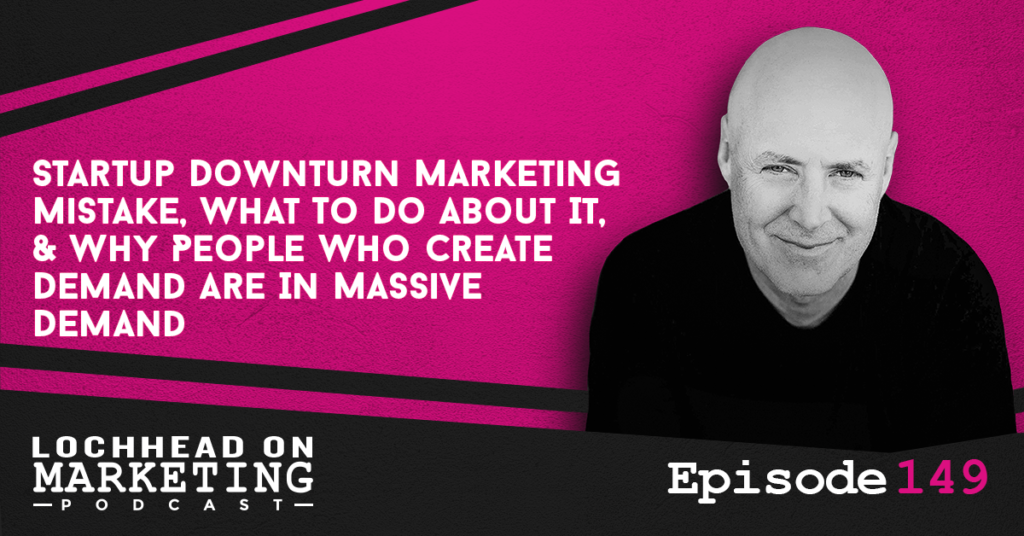149 Startup Downturn Marketing Mistake, What To Do About It, & Why People Who Create Demand Are In Massive Demand

Podcast (lochheadonmarketing): Play in new window | Download (Duration: 18:37 — 12.8MB) | Embed
Subscribe: Apple Podcasts | Spotify | RSS | More
On this episode of Lochhead on Marketing, let’s talk about the big startup downturn marketing mistakes and what to do about it. We also talk about why people who create demand are in massive demand.
Lastly, there is the topic about your career, and what to do when the economy goes sideways, both in your business and in your career.
Welcome to Lochhead on Marketing. The number one charting marketing podcast for marketers, category designers, and entrepreneurs with a different mind.
Startup Downturn Marketing Mistake
The reality is, it’s not just startups who make this mistake.
But before that, let’s go through the top 10 list of what happens when the recession hits.
Number one, the recession hits. The immediate impact of that, of course, is number two, demand falls. So what do most companies do? Number three, they market hard in an effort to catch demand.
Remember, when most people say marketing, what they mean is compete in an existing market category for existing demand. So when they do marketing, what they’re really doing is demand capture.
So when the recession hits to demand falls, three, they market hard to catch, falling demand or some people say catch a falling knife. As a result, number four, customer acquisition costs aka CAC goes up.
Number six to nine is just running around in circles, repeating numbers two to four. Until you reach number ten, where they finally run out of time and money.
Here’s the big learning: He who competes for demand loses, she who creates demand wins. It also happens to be why category design is the most powerful underground skill in business. Most people don’t understand that just like you can create and design a product and accompany you could also create and design a market category.
Recession through a Different Lens
I get into trouble for saying this, but most people immediately assume a negative defensive position in a recession or a downturn. However, approximately 10% of companies get stronger during the recession.
In the last week, I have had many conversations with entrepreneurs and CEOs about how to take advantage of the coming downturn. I know that sounds crazy to a lot of people, but you can’t be in the 10%, that gets stronger, and you can’t be in the elite companies that actually are able to take advantage of a downturn unless you at least ask the questions. So I’m asking you to consider a different way.
Choosing a Different Way
So here’s the different way and specific as it relates to shrinking demand. So there’s three kinds of demand. Number one, as we talked about demand capture. Number two, demand creation. That’s why some people call it category creation.
One of the stupid arguments we hear all the time is, “well, category design is dumb, because why would we go to a market where there’s zero demand, and we have to create it all, when we can just catch demand? Okay? She who creates the demand wins. That’s why.
Now in a downturn, here’s the problem. It can take some time to create demand. People say, “well, we don’t have time our revenues falling, we need to generate revenue now.” This is where the third type of approach, wherein we dam the demand. By doing so, you redirect demand from an existing market to a new solution that your product or services provides.
To hear more about how to deal with Startup Downturn Marketing Mistake, download and listen to this episode.
Bio
Christopher Lochhead is a #1 Apple podcaster and #1 Amazon bestselling co-author of books: Niche Down and Play Bigger.
He has been an advisor to over 50 venture-backed startups; a former three-time Silicon Valley public company CMO and an entrepreneur.
Furthermore, he has been called “one of the best minds in marketing” by The Marketing Journal, a “Human Exclamation Point” by Fast Company, a “quasar” by NBA legend Bill Walton and “off-putting to some” by The Economist.
In addition, he served as a chief marketing officer of software juggernaut Mercury Interactive. Hewlett-Packard acquired the company in 2006, for $4.5 billion.
He also co-founded the marketing consulting firm LOCHHEAD; the founding CMO of Internet consulting firm Scient, and served as head of marketing at the CRM software firm Vantive.
We hope you enjoyed this episode of Lochhead on Marketing™! Christopher loves hearing from his listeners. Feel free to email him, connect on Facebook, Twitter, Instagram, and subscribe on iTunes!

